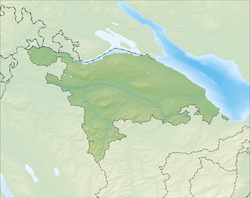Amriswil
| Amriswil | ||
|---|---|---|

Village Hagenwil
|
||
|
||
| Coordinates: 47°33′N 9°18′E / 47.550°N 9.300°ECoordinates: 47°33′N 9°18′E / 47.550°N 9.300°E | ||
| Country | Switzerland | |
| Canton | Thurgau | |
| District | Arbon | |
| Government | ||
| • Executive |
Stadtrat with 9 members |
|
| • Mayor |
Stadtpräsident Martin Salvisberg SVP/UDC (as of 2009) |
|
| • Parliament | none (Kommissionen) | |
| Area | ||
| • Total | 19.02 km2 (7.34 sq mi) | |
| Elevation (evang.-protestant Church) | 450 m (1,480 ft) | |
| Population (Dec 2015) | ||
| • Total | 13,113 | |
| • Density | 690/km2 (1,800/sq mi) | |
| Demonym(s) | German: Amriswiler(in) | |
| Postal code | 8580 | |
| SFOS number | 4461 | |
| Localities | Mühlebach, Hagenwil, Biessenhofen, Oberaach, Nideraach, Schocherswil, Auenhofen | |
| Surrounded by | Egnach, Erlen, Hefenhofen, Muolen (SG), Salmsach, Sommeri, Zihlschlacht-Sitterdorf | |
| Website |
www SFSO statistics |
|
Amriswil is a town and a municipality in Arbon District in the canton of Thurgau in Switzerland near the Lake Constance.
The official language of Amriswil is (the Swiss variety of Standard) German, but the main spoken language is the local variant of the Alemannic Swiss German dialect.
Amriswil is first mentioned in 799 as Amalgeriswilare. During the Middle Ages Amriswil and Brüschwil were part of a Bishop's fief. During the 15th Century, the Helmsdorf family ruled in Eppishausen. In the early 17th Century, the village of Amriswil was sold to Adam Tschudi of Glarus, and in 1665 the hospital was sold to St. Gallen. The court rights over Amriswil, Hölzli, Brüschwil and houses in Ruti and Giezenhaus were acquired by the city of Bürglen, which was under the control of the city of St. Gallen. This situation remained unchanged until 1798.
In the mid-14th Century, chapel dedicated to Mary, was built in Amriswil. This chapel was part of the parish of Sommeri. After the Protestant Reformation of 1529 the majority in Sommeri returned to the old faith. However, the inhabitants of Amriswil remained with the Reformed faith and the chapel was given to Protestants. After 1630 there were weekly sermons, and after 1680 the chapel held regular Sunday services. Since 1710, the Reformed pastor lived in Amriswil, and it was united with Sommeri in a common parish. This remained the situation until migration in the 19th Century changed the religious situation. In 1891, a large Reformed church was constructed in Amriswil. Then, in 1911 the Catholic parish of Amriswil and Sommeri separated and an independent parish was established in Amriswil, followed by the 1939 inauguration of the Catholic Church of St. Stephen.
...
Wikipedia




